Wolfram Function Repository
Instant-use add-on functions for the Wolfram Language
Function Repository Resource:
Generate a token-event graph for multicomputational evolution according to particular rules
ResourceFunction["TokenEventGraph"][rules, init, t] generates a token-event graph for t steps of evolution according to rules from init. |
| "Mode" | "Tuples" | how to match multiple tokens: "Tuples", "OrderedTuples", "Subsets” or "OrderlessSubsets" |
| "TokenDeduplication" | True | whether to deduplicate tokens, False deduplicates across time steps, None turn off deduplication completely |
| "EventDeduplication" | False | whether to deduplicate events: False,True, "Inputs", "Outputs”, All |
| "EdgeDeduplication" | False | whether to remove multiedges |
| "RemoveEventLoops" | False | whether to remove event edge loops |
| "RemoveEmptyEvents" | True | whether to remove events with no outputs |
| "TokenDecompositionFunction" | Automatic | function to decompose a state into a list of tokens |
| "TokenRecombinationFunction" | ({Union@@#1}&) | function to combine a list of output tokens into list of states |
| “TokenEquivalenceFunction" | SameQ | function to merge equivalent tokens |
| "EventStoreFunction" | Splice[{#1,#2,#3,#4}] & | what part of an event to store inside an event vertex |
| "MultiOutputEvents" | True | whether to allow multi-output events |
| "EventVertices" | True | whether to include event vertices |
| "StateVertices" | False | whether to include state vertices |
| "TokenVertices" | True | whether to include token vertices |
| "TokenLabeling" | True | how to label token vertices |
| "EventLabeling" | None | how to label event vertices |
| "TokenRenderingFunction" | Identity | how to render tokens inside boxes |
| "TokenStyleOptions" | Automatic | options for token box Style |
| "TokenFrameOptions" | Automatic | options for token box Frame |
Make a token-event graph of a simple rule:
| In[1]:= |
| Out[1]= |  |
Multiple rules:
| In[2]:= |
| Out[2]= | 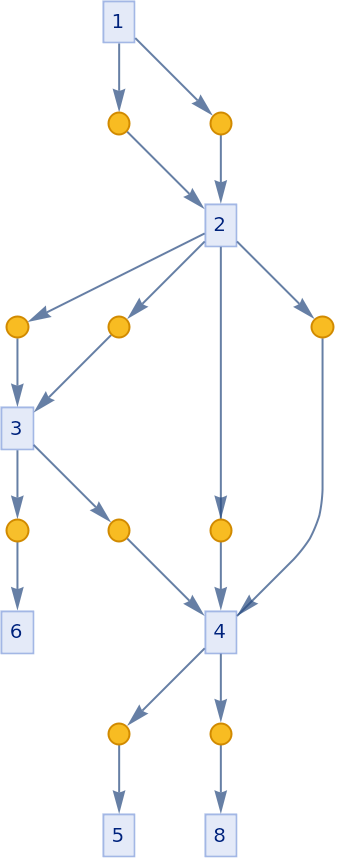 |
Make a Wolfram Model-like TokenEventGraph:
| In[3]:= | ![Module[{w = 0}, ResourceFunction[
"TokenEventGraph", ResourceSystemBase -> "https://www.wolframcloud.com/obj/resourcesystem/api/1.0"][{{{x_, y_}, {y_, z_}} :> {{w++, y}, {y, z}, {z, w}, {x, w}}}, {{{0, 0}}}, 3, AspectRatio -> 1/2]]](https://www.wolframcloud.com/obj/resourcesystem/images/55d/55d93118-ad15-4514-be21-45bd34fdde29/55beb952f006ba68.png) |
| Out[3]= | 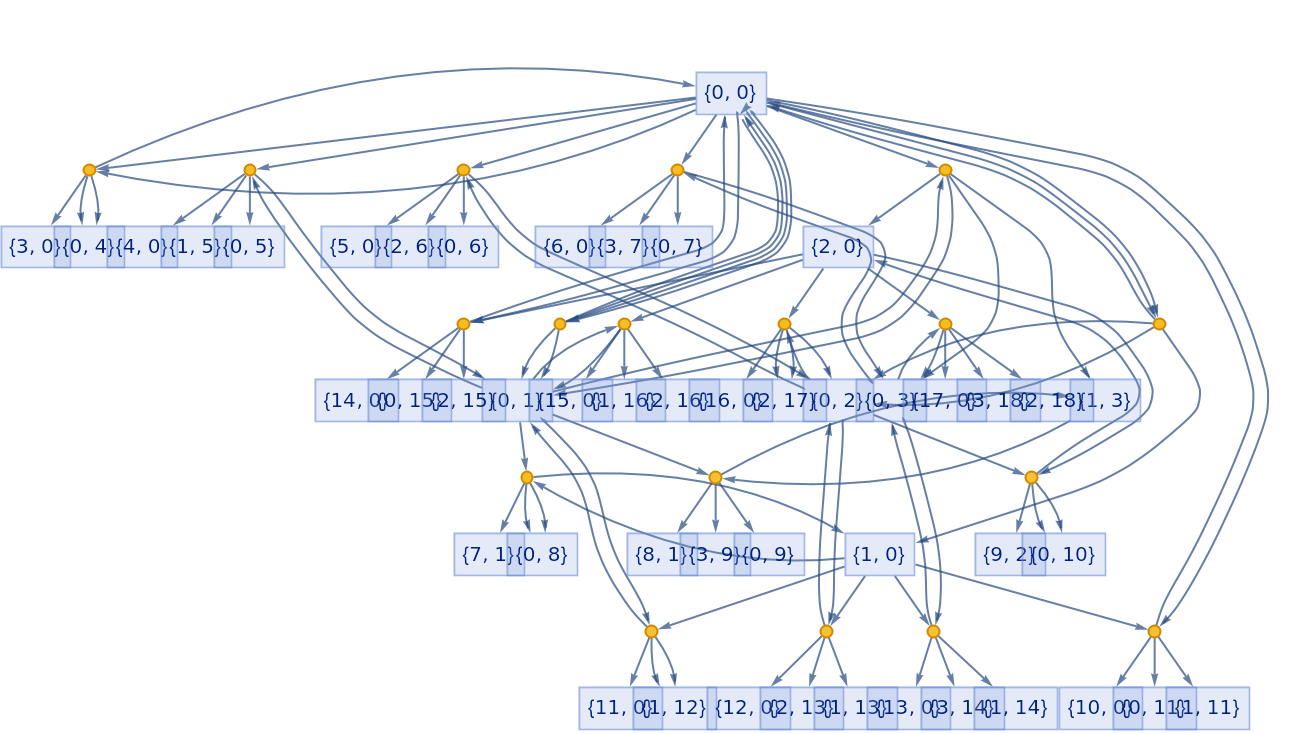 |
Edges are tagged by corresponding input or output list index:
| In[4]:= |
| Out[4]= | 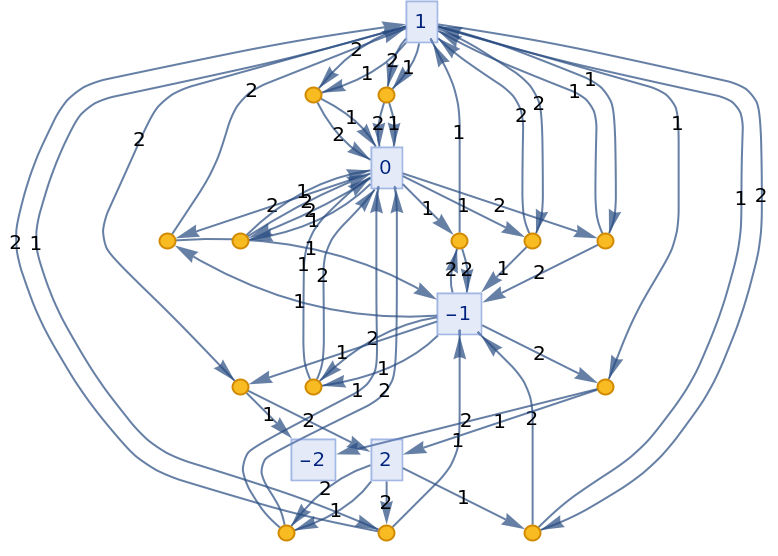 |
Tag edges with keys by having associations on both sides of a rule:
| In[5]:= |
| Out[5]= | 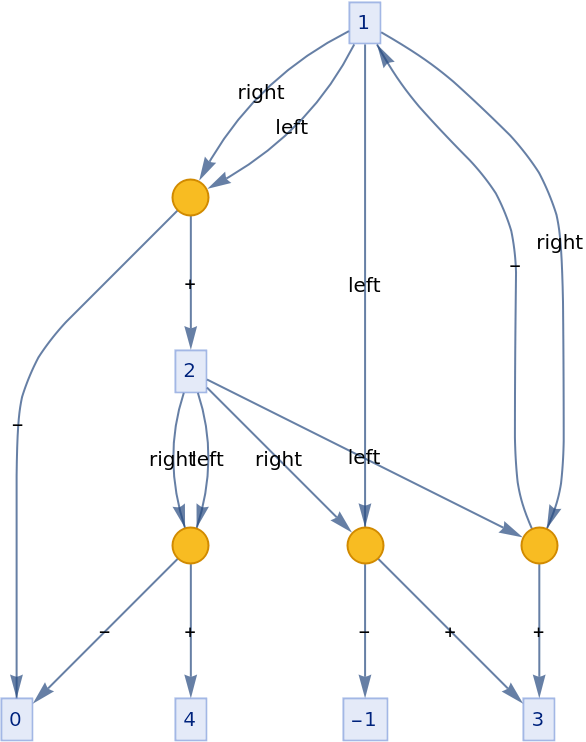 |
Mode of picking tokens can be one of: "Tuples" (default), "OrderedTuples", "Subsets":
| In[6]:= |
| Out[6]= |  |
| In[7]:= |
| Out[7]= |  |
| In[8]:= |
| Out[8]= | 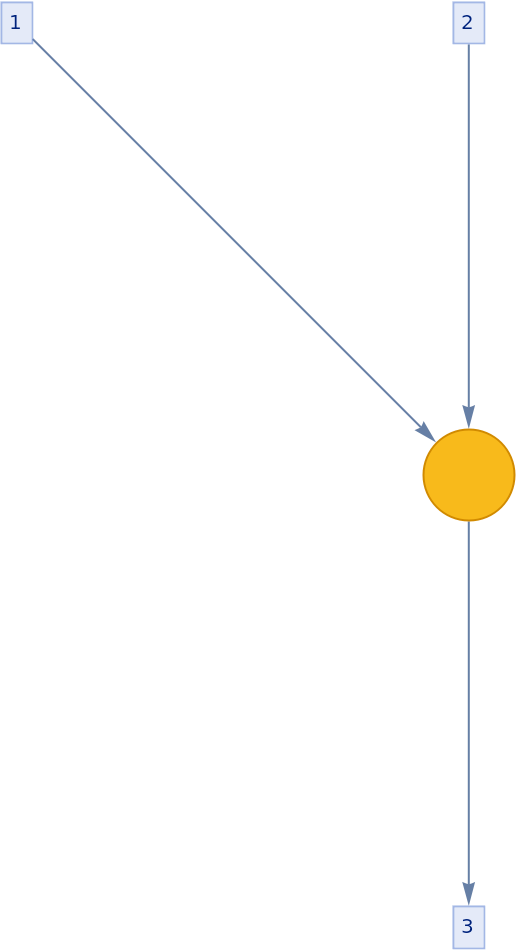 |
| In[9]:= |
| Out[9]= | 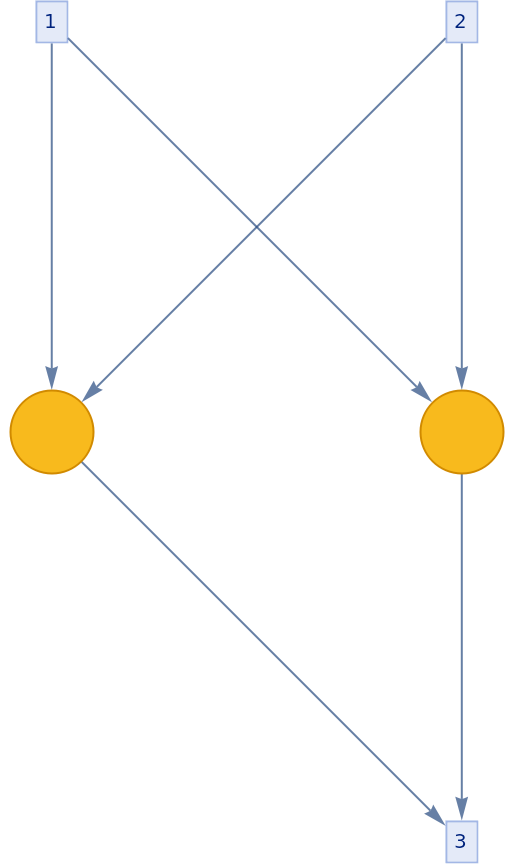 |
Every token is deduplicated by default:
| In[10]:= |
| Out[10]= | 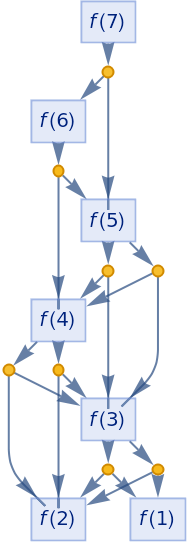 |
"TokenDeduplication"→False turns off deduplication across time steps:
| In[11]:= |
| Out[11]= | 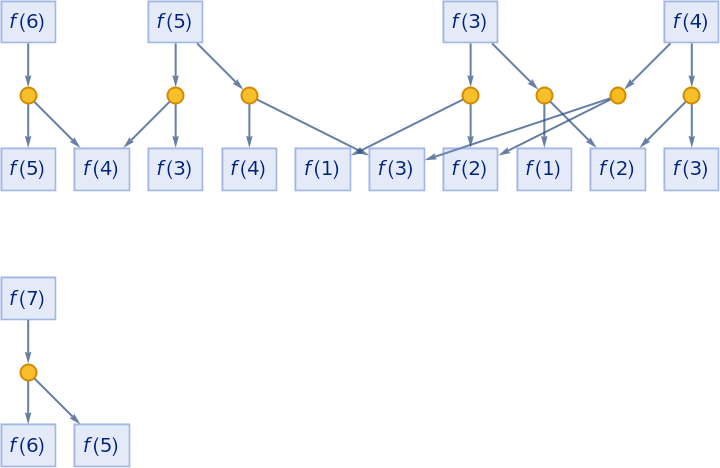 |
"TokenDeduplication"→None turns off any deduplication:
| In[12]:= |
| Out[12]= | 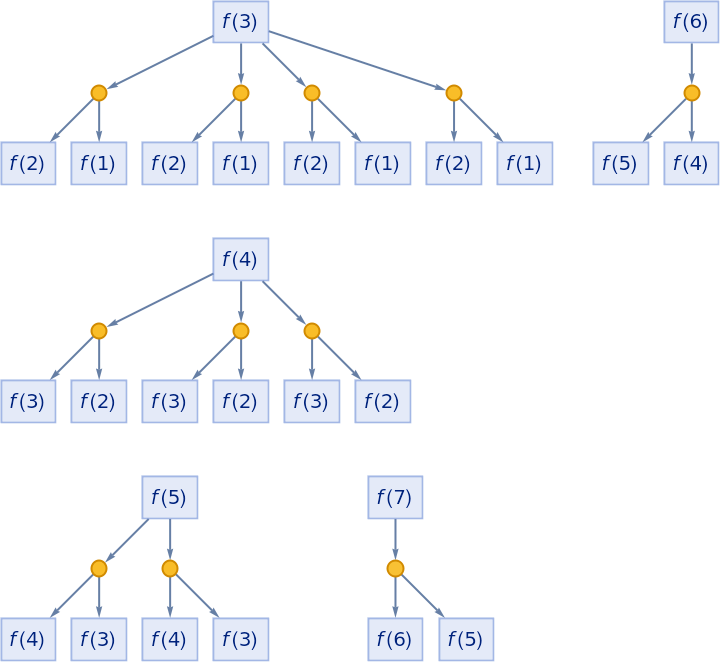 |
Remove multiedges:
| In[13]:= |
| Out[13]= | 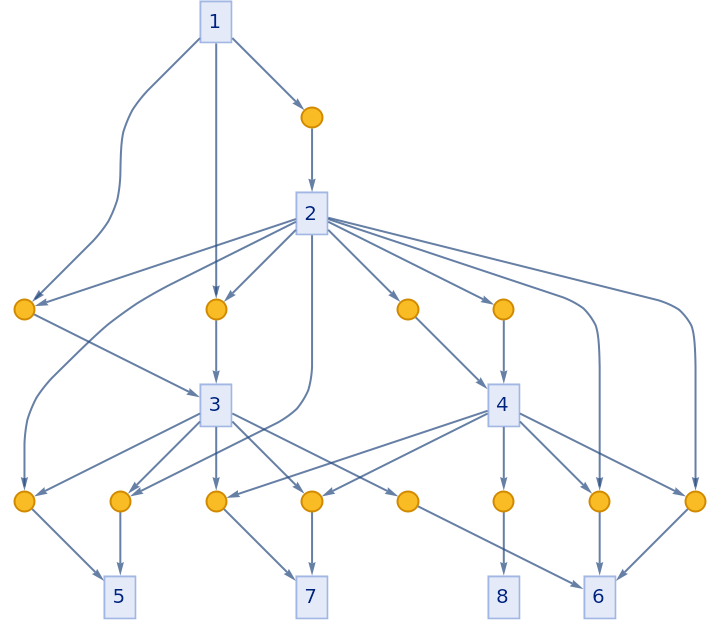 |
Deduplicate events based on a rule:
| In[14]:= | ![ResourceFunction[
"TokenEventGraph", ResourceSystemBase -> "https://www.wolframcloud.com/obj/resourcesystem/api/1.0"][{n_ :> n + 1, n_ :> 2 n}, {{1, 2}}, 2, "EventDeduplication" -> True, VertexLabels -> {"Event", _, id_, ___} :> id]](https://www.wolframcloud.com/obj/resourcesystem/images/55d/55d93118-ad15-4514-be21-45bd34fdde29/6296283a3f068fcc.png) |
| Out[14]= |  |
Deduplicate events based on its "Inputs", "Outputs" or both:
| In[15]:= |
| Out[15]= |  |
| In[16]:= |
| Out[16]= |  |
Deduplicate all events:
| In[17]:= |
| Out[17]= |  |
Exclude event vertices:
| In[18]:= |
| Out[18]= | 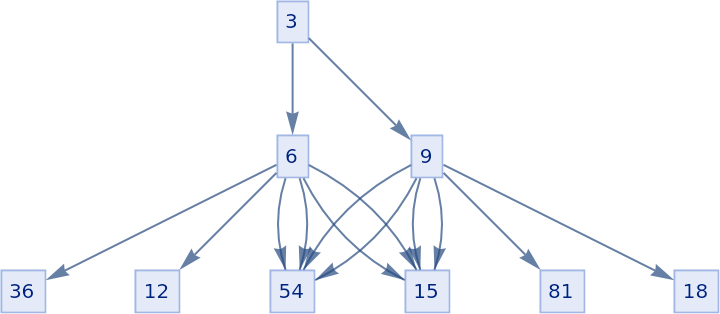 |
Include state vertices:
| In[19]:= |
| Out[19]= | 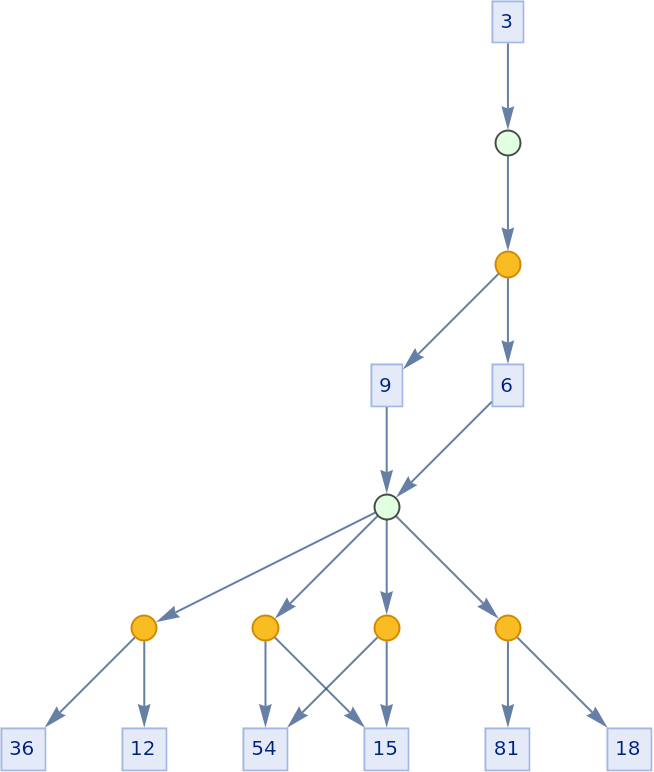 |
Exclude token vertices:
| In[20]:= |
| Out[20]= |  |
Specify how states are decomposed into a list of tokens:
| In[21]:= | ![ResourceFunction[
"TokenEventGraph", ResourceSystemBase -> "https://www.wolframcloud.com/obj/resourcesystem/api/1.0"][{n_, m_} :> {n m, n + m}, {{3}}, 3, "TokenDecompositionFunction" -> Select[OddQ]@*Echo, "StateVertices" -> True]](https://www.wolframcloud.com/obj/resourcesystem/images/55d/55d93118-ad15-4514-be21-45bd34fdde29/02af7788237340cf.png) |
| Out[21]= | 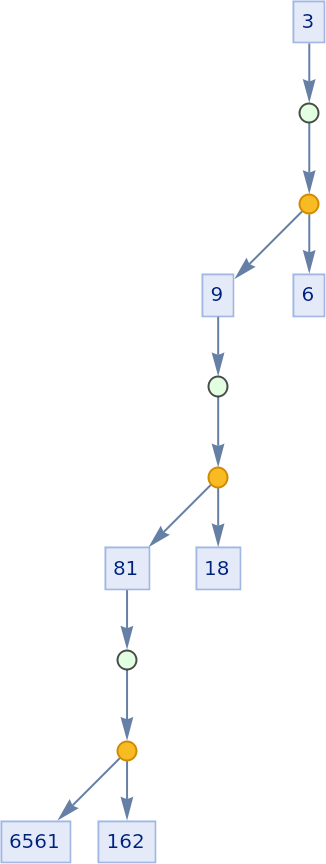 |
Specify how tokens are recombined into states (the default is a single state containing the union of all output tokens). Here is an example of making a separate state from each token:
| In[22]:= | ![ResourceFunction[
"TokenEventGraph", ResourceSystemBase -> "https://www.wolframcloud.com/obj/resourcesystem/api/1.0"][{n_, m_} :> {n m, n + m}, {{3}}, 3, "TokenRecombinationFunction" -> ({outputs, inputs, stateTokens} |-> Flatten[outputs]), "StateVertices" -> True]](https://www.wolframcloud.com/obj/resourcesystem/images/55d/55d93118-ad15-4514-be21-45bd34fdde29/000baf52036c958a.png) |
| Out[22]= | 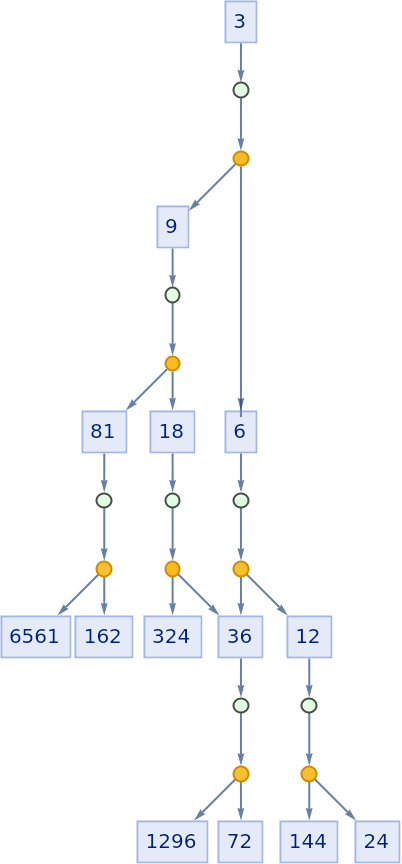 |
Specify an equivalence function for tokens:
| In[23]:= | ![ResourceFunction[
"TokenEventGraph", ResourceSystemBase -> "https://www.wolframcloud.com/obj/resourcesystem/api/1.0"][{n_, m_} :> {n m, n + m}, {{1}}, 3, "TokenEquivalenceFunction" -> (Mod[#1, 3] == Mod[#2, 3] &)]](https://www.wolframcloud.com/obj/resourcesystem/images/55d/55d93118-ad15-4514-be21-45bd34fdde29/4cd34dda0e0e3ba4.png) |
| Out[23]= | 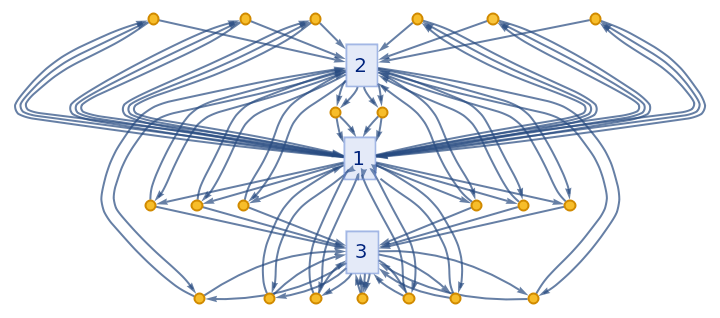 |
Change what is stored inside "Event" vertices:
| In[24]:= | ![ResourceFunction[
"TokenEventGraph", ResourceSystemBase -> "https://www.wolframcloud.com/obj/resourcesystem/api/1.0"][{n_, m_} :> {n m, n + m}, {{2, 3}}, 1, "EventStoreFunction" -> ({stepId, ruleId, eventId, pos, inputs, ouputs} |-> Splice[{inputs, ouputs}]), VertexLabels -> {"Event", ___} -> Placed[Automatic, Center]]](https://www.wolframcloud.com/obj/resourcesystem/images/55d/55d93118-ad15-4514-be21-45bd34fdde29/7e97481e570a6530.png) |
| Out[24]= | 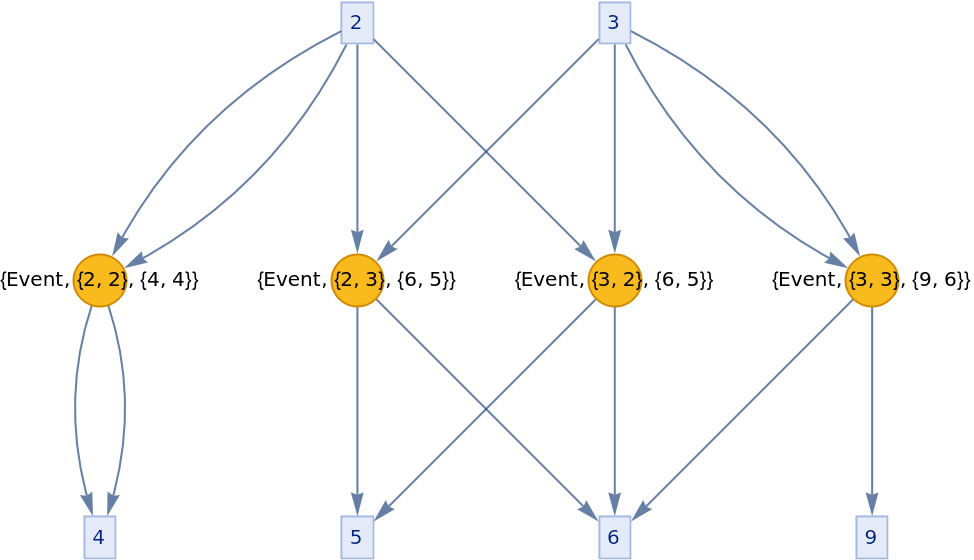 |
By default, only stepId, ruleId, eventId and positions are stored:
| In[25]:= | ![ResourceFunction[
"TokenEventGraph", ResourceSystemBase -> "https://www.wolframcloud.com/obj/resourcesystem/api/1.0"][{n_, m_} :> {n m, n + m}, {{2, 3}}, 1, VertexLabels -> {"Event", ___} -> Placed[Automatic, Center]]](https://www.wolframcloud.com/obj/resourcesystem/images/55d/55d93118-ad15-4514-be21-45bd34fdde29/2495b24b1e92004c.png) |
| Out[25]= | 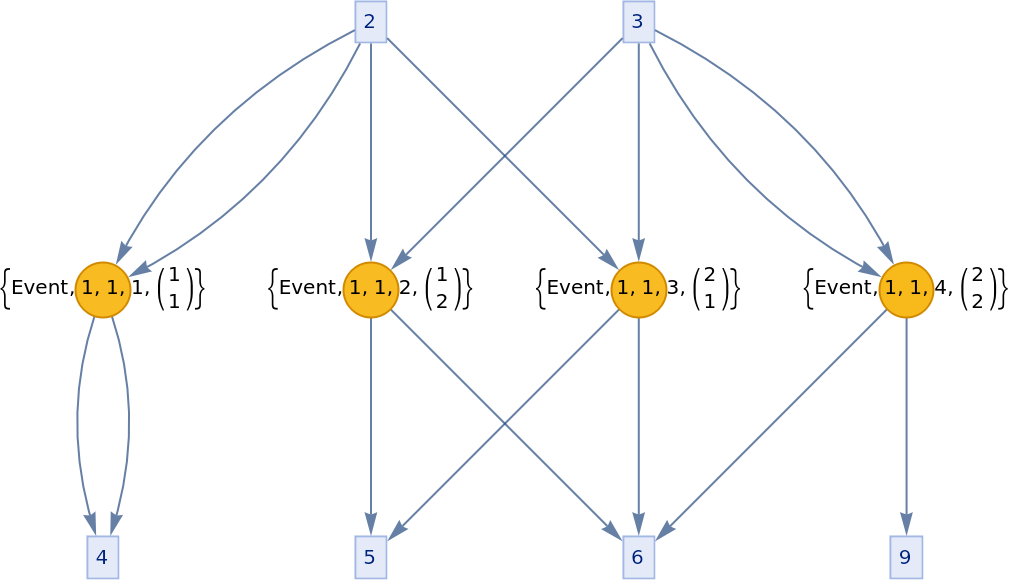 |
Whether to split each event with multiple outputs into separate events:
| In[26]:= |
| Out[26]= |  |
| In[27]:= |
| Out[27]= | 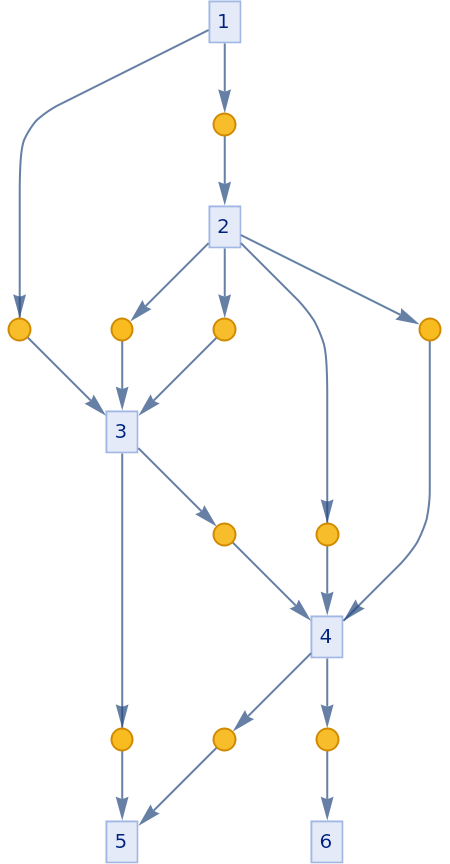 |
Disable custom token labeling:
| In[28]:= |
| Out[28]= | 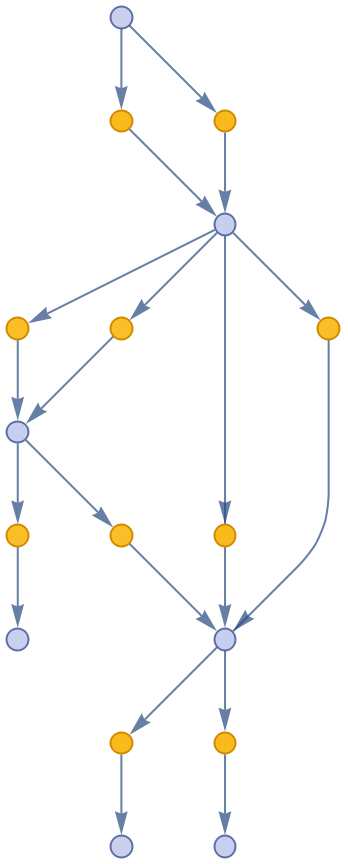 |
Label events by its rule index:
| In[29]:= | ![ResourceFunction[
"TokenEventGraph", ResourceSystemBase -> "https://www.wolframcloud.com/obj/resourcesystem/api/1.0"][{n_ :> n + 1, n_ :> 2 n}, {{1, 2}}, 2, "EventDeduplication" -> False, "EventLabeling" -> "Colors"]](https://www.wolframcloud.com/obj/resourcesystem/images/55d/55d93118-ad15-4514-be21-45bd34fdde29/52cf57c990a7252e.png) |
| Out[29]= | 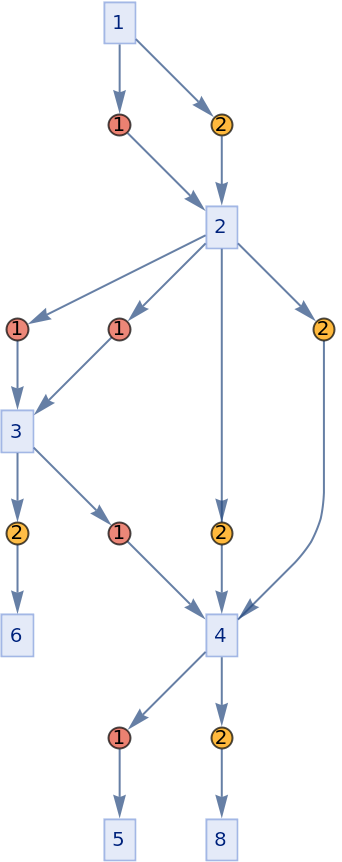 |
Specify rendering for the tokens:
| In[30]:= | ![ResourceFunction[
"TokenEventGraph", ResourceSystemBase -> "https://www.wolframcloud.com/obj/resourcesystem/api/1.0"][{n_ :> n + 1, n_ :> 2 n}, {{1, 2}}, 2, "TokenRenderingFunction" -> (Style[#, 12, Bold, Red] &)]](https://www.wolframcloud.com/obj/resourcesystem/images/55d/55d93118-ad15-4514-be21-45bd34fdde29/3f07937562ea3781.png) |
| Out[30]= | 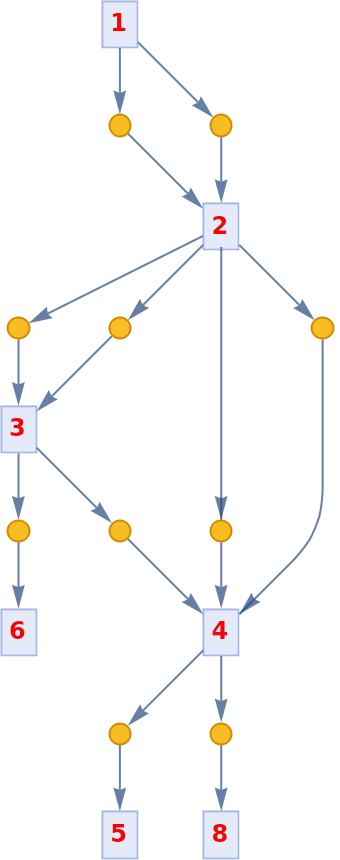 |
Provide style options for token boxes:
| In[31]:= | ![ResourceFunction[
"TokenEventGraph", ResourceSystemBase -> "https://www.wolframcloud.com/obj/resourcesystem/api/1.0"][{n_ :> n + 1, n_ :> 2 n}, {{1, 2}}, 2, "TokenStyleOptions" -> {FontFamily -> "Helvetica", FontColor -> Orange}]](https://www.wolframcloud.com/obj/resourcesystem/images/55d/55d93118-ad15-4514-be21-45bd34fdde29/172b7a0fb4eb6541.png) |
| Out[31]= | 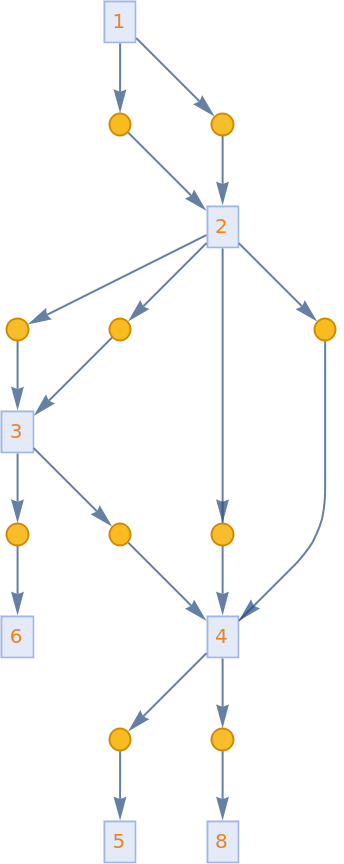 |
Provide frame options for token boxes:
| In[32]:= | ![ResourceFunction[
"TokenEventGraph", ResourceSystemBase -> "https://www.wolframcloud.com/obj/resourcesystem/api/1.0"][{n_ :> n + 1, n_ :> 2 n}, {{1, 2}}, 2, "TokenFrameOptions" -> {FrameMargins -> 0, Background -> Green}]](https://www.wolframcloud.com/obj/resourcesystem/images/55d/55d93118-ad15-4514-be21-45bd34fdde29/344ea35099ac1790.png) |
| Out[32]= | 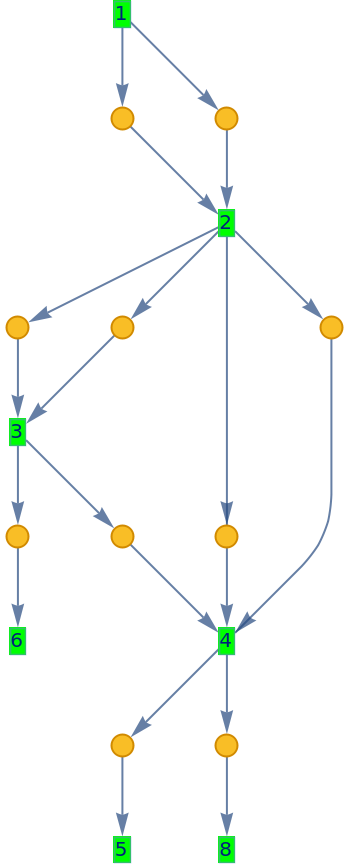 |
Wolfram Language 13.0 (December 2021) or above
This work is licensed under a Creative Commons Attribution 4.0 International License